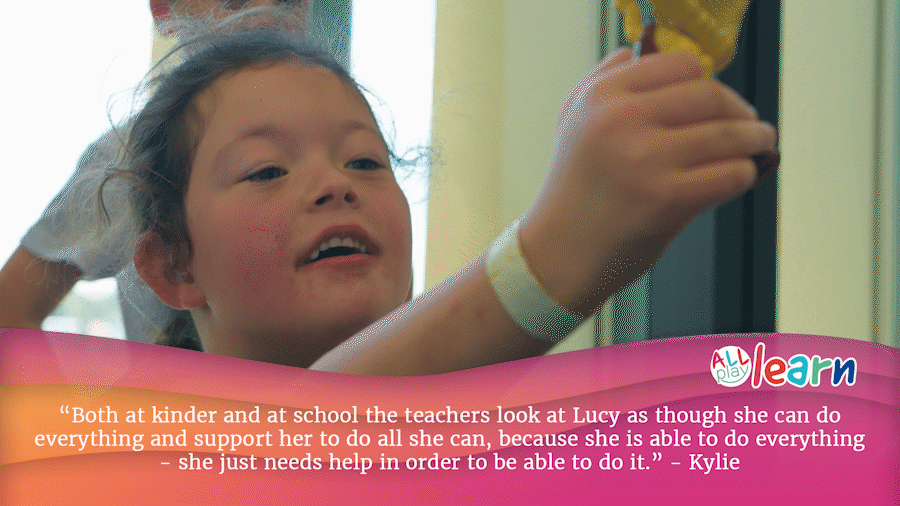
Parent Guide
to Inclusion
On this page:
- Welcome
- Plan for a positive start
- Build a positive partnership
- Get ready before starting long day care and/or kindergarten
- Keep track of how things are going
- Resources for home, early childhood education and care settings and school
- Consider opportunities outside of early childhood education and care settings

Welcome
Here you will find a step-by-step guide to navigating early childhood education and care settings for your child with a disability or developmental challenge. There are also frequently asked questions and other resources to help you support your child at long day care and kindergarten.
Choosing an early childhood education and care setting can be a hard decision. As a parent of a child with a disability or developmental challenge, you will often need to think about many different areas.
Your decision may be affected by your family’s circumstances and preferences for education programs, location, opening hours and pricing. You may also need to work with the early childhood education and care setting so they are ready to meet your child’s accessibility, learning and support needs.
The following steps can help guide you in the process of choosing a long day care centre or kindergarten and supporting your child in their preschool experience.
1. Plan for a positive start to early childhood education and care
Long day care centres often have a long wait list so you may need to start investigating, planning and getting organised at least 12 months before you plan to send your child to long day care. Enrolment for standalone kindergartens (e.g. community kindergartens) on the other hand usually takes place the year before your child goes to kindergarten. Learn about different settings, visit your preferred choices and seek advice to support your child in their preschool experience.
Learn about early childhood education and care settings
Visit your preferred choices
Some things to consider
You can ask the director and educators about
Seek advice to guide your decision
- Enrolment process and entry criteria
- Availability of qualified educators with training or further studies on developmental challenges
- Previous experiences with children with disabilities, in general, but also specifically with your child’s disability or developmental challenge
- Communication practices between home and early childhood education and care settings. For example, some centres use a ‘communication book’ to enable daily contact, and some use digital platforms to share observations and encourage regular communication
- Approach towards children’s eating, sleeping and toileting needs, how they will accommodate any individual needs of your child and, how they will:
- Make modifications to the physical environment to accommodate your child’s needs
- Meet your child’s medical or personal care needs
- Make sure your child is included
- Communicate with your child’s Early Childhood Early Intervention partner and/or medical and allied health professionals

2. Build a positive partnership with the early childhood education and care setting
Build a partnership with the early childhood education and care setting. Work with your child’s educators to identify evidence-based strategies for including your child in preschool life.
You can work with your child’s educators to identify developmental and learning goals, and to create strengths-based strategies to reach these goals. Your knowledge about your child’s interests and strengths will be an important element in helping the educators understand the best ways to work with your child in the program. For example, you could consider sharing:
- Activities, people, objects and places that your child enjoys
- Activities that your child finds difficult or frustrating
- Your child’s interactions with other children
- The agencies, medical and allied health professionals working with your family and child
- Your child’s preferences for and routines for sleeping, eating and toileting
- View daily strategies for toileting and sleeping
- Consider using AllPlay Learn's Strengths and abilities communication checklist which you can find in our parent resources page
In some cases, you may be unsure about your child’s development. If you notice that your child has some developmental or learning delays at home or in another setting, you may wish to discuss these with the educators. Access AllPlay Learn’s parent guide to parent-educator meetings below. You can work together to develop effective learning strategies and modifications for your child and monitor and/or receive advice. You can learn more about the early signs of developmental delays and what to do if you are concerned.
3. Get ready before starting long day care and/or kindergarten
Starting long day care and/or kindergarten is a significant milestone for all children and their families. Learn more about supporting your child as they transition into an early childhood education and care setting.
4. Keep track of how things are going
Some children may find particular aspects of their days at early childhood education and care settings challenging. For example, a child may become anxious or upset at ‘drop-off time’ when their parent or carer leaves. Other children may experience anxiety when there are changes to educators or routines. Some children may find it challenging to make friends and others may find following instructions difficult. If your child has challenges in these areas, or you have any other concerns, you can work with the educators to develop strategies to help them cope with daily activities, transitions and changes to the regular routines of long day care or kindergarten. View daily strategies for supporting your child at early childhood education and care settings, or read stories with your child about life at these settings.

Resources for home, early childhood education and care settings and school
AllPlay Learn has a range of resources that you can use with your child. These are designed to help your child prepare for early childhood education and care settings and school and to support their wellbeing both at home and at long day care and/or kindergarten throughout the day.

Consider opportunities outside of early childhood education and care settings
Consider activities outside of early childhood education and care settings for your child such as those that encourage socialising and physical activity.
Check out the AllPlay Footy and AllPlay Dance resources to see if these types of activities might be a good fit for your child. The AllPlay Dance directory has lists of inclusive programs in Australia for children and young people.


